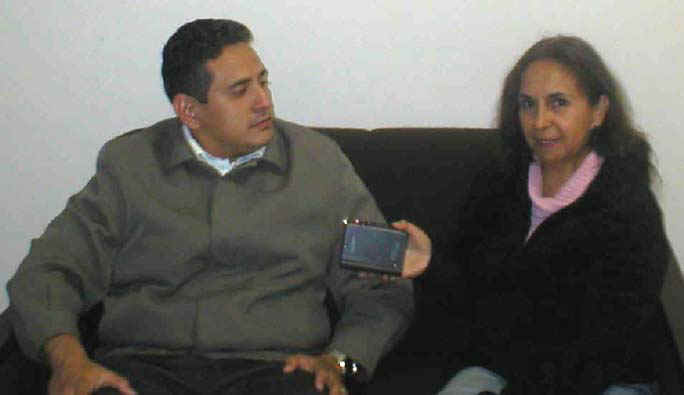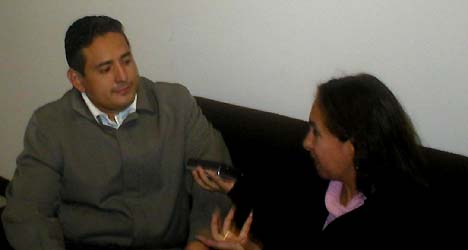Spain was extremely sensitive about Manila and the Philippine Islands
because Manila was the anchorage of the treasure galleons moving the
benefits of Spains Far Eastern trade to Acapulco, thence to
Veracruz,
thence to Havana, and on to Spain. During the Seven Years War ending
in
1763, England had captured both Manila and Havana, the two ports which
were keys to Spains overseas wealth. Spain could not allow these
cities
to be lost again. When it became clear there was to be another war
with
England, Spain began reinforcing Manila and the Philippines with
soldiers, money for fortifications, and people and resources for
shipbuilding at Manila.
The resources for the San Blas Naval Department, which had been built
to
support California, were shifted to the support of Manila, and
California was limited to land support for almost two years. The first
ship to leave San Blas for Manila in 1779 was the packetboat San
Carlos
soon followed by the second ship, the packet boat Príncipe. Another
which
moved was the frigate Princesa in 1780, but it returned in 1781 Within
two years, new ships which had been built in Manila began to come back
to San Blas as replacements, including the Aránzazu in 1780 and the
San
Carlos ( El Filipino). Names of some officers known to have been
available to make the trips to Manila are known and are shown below.
Only a few individual sailors are named; however, some of the probable
mariners are known based on their prior or subsequent service on these
ships. These are included in the compilation below. Names of those who
manned the Manila Naval Department have not been recovered.
In 1780, a picket of 100 soldiers was sent from Mexico to help defend
the City of Manila. Others were sent from veteran Corona, Asturias,
and
Granada regiments in Mexico plus two companies of the Regt of Dragoons
of Spain and Mexico for a total of 400. At the beginning of the war we
know there was one Regiment of Infantry del Rey garrisoned in Manila,
with two battalions, each with eight companies of Fusiliers and one
company of Grenadiers; one Company de Malabares at Cavite; and one
unit
of Cavalry, the Esquadrón de Dragones de Luzón, with three
companies;
and two companies of artillery. There were about 2000 effective
soldiers
in the Philippines at the beginning of the war. There were also
militia
units of varying degrees of effectiveness. These units were reinforced
with men from the Philippines. We have not found lists of these and
other soldiers for the war period, but we do have some of the key
persons in the units in the Philippines after the war. There seems to
have been seven units assigned for the period 1788-1801, but given
different titles for different years;
(1) Regimiento de Infanteria del
Rey;
(2) Real Cuerpo del Artilleria/Plaza de Manila/Regimiento Fijo de
la Plaza del Manila;
(3) Battalón del Real Príncipe/Battalón de
Milicias
del Real Príncipe/Regt Milicias del Real Príncipe;
(4) Escuadron de
Dragones del Luzón;
(5) Compañia de Malavares/Compañia Veterana de
Infanteria del Malavares;
(6) Plaza de Cavite; and
(7) the Fuerza de
Santiago/Real Fuerza de Santiago.
The key persons from these units who
show service during the war are shown below with an asterisk. Those
without an asterisk may also have served in wartime, but we did not
see
suitable records. Also, wartime service was not necessarily in the
Philippines. (Legajo 7268, LDS film 1156332).
*Rafael María de Aguilar y Ponce de Leon ( - 8 Aug 1806,
Philippines).
Fernandez:114, Knight of the Order of Alcántara, military officer,
and
gentleman of the bedchamber, served as Governor of the Philippines
from
1 Sep 1793 until 7 Aug 1806. He probably had wartime service.
*Juan de Aguirre (1729 - ). Entered service 1741, Captain, Comp Vet
Inf,
Malabares, 1796 and 1801, Legajo 7268:III:38.
*Marcos Aguirre. Serra:San Carlos, mariner in Jul 1783 on the San
Carlos
(El Filipino).
Ignacio María de Alava. DT:188, Chief of naval Squadron in
Philippines
in 1796.
*Pedro Alayosalgas. DT:177, SubLt, 2d Comp, Regt del Real Príncipe,
at
Binondo, 1779.
Duque de la Alcudia. DT:189, involved in the 1796 defense of the
Philippines.
*Francisco Alegria (1755 Mifanoas, Provincia de Alaba - ), single in
1788, entered service 1775, was Lt by 1776. Capt, Inf del Rey, 1796
and
1800, Legajo 7268:III:68.
*Irazaque Alonzo. DT:177, SubLt, 1779, 2d Comp, Regt del Real Príncipe,
at Santa Cruz.
*Francisco Alvarez Castro. Pilot for the Aránzazu on its voyage from
Manila to San Blas, 1781.
*Jacinto Álvarez. DT:177, Capt, 3rd Comp, Regt del Real Príncipe, at
Binondo, 1779.
*Vicente Alvarez. DT:177, Lt, 2d Comp, 1779 at Santa Cruz, Capt, Bn
del
Real Príncipe, 1800, Legajo 7268:III:27,v.
*Domingo Amador. Serra:San Carlos, mariner in Jul 1783 on the San
Carlos
(El Filipino).
*Miguel del Amo (1842 Burgo de Osma, Castilla la Vieja - ), single in
1788, entered service in 1762, Adjutant in 1779 and 1788. Adjutant and
Capt Grad, Escuadrón de Dragones de Luzón, 1796, Legajo 7268:VI:638.
*Mariano Anejas. 1st Cpl 3rd Comp, 1779, Sgt, 1st Grenadier Comp, Bn
del
Real Príncipe, 1800, Legajo 7268:III:34.
*Pascual de los Angeles. Soldier, 2d Comp, 1779, Sgt, Bn del Real
Príncipe, 1800, Legajo 7268:III:330.
Pedro Anguia. DT:179, SubLt, Urban Militia of Manila, 1773.
*Joaquin Angulo (1755 Manila - ), married by 1788, entered service
1771,
Lt in 1782, Lt of Grenadiers in 1796. Capt, Inf del Rey, 1800, Legajo
7268:III:76.
*Felipe Antonio. DT:177, Lt, 8th Comp, 1779, Capt, 1800, Bn del Real
Príncipe, Legajo 7268:III:28.
*Miguel Antonio. DT:177, Lt of Grenadiers, 1779, Capt, 1800, Bn del
Real
Príncipe, Legajo 7268:III:28.
*Martin de Aranda (1745 Viscaya, Spain - ), entered service 1759, Capt
in 1782, single. Capt, Inf del Rey, 1800, Legajo 7268:IV:204.
*Manuel Arce/Arze (1762 Peru - ), SubLt in 1780, married by 1788.
Adjutant Major, Capt Grad, Inf del Rey, 1800, Legajo 7268:III:78.
*José de Arcega/Arzega (1732/33 Pueblo Malinao, Province of Albay,
Nueva
Caseres, Filipinas - ), Capt and Adjutant Major in 1776, Capt, Vets of
Malavares, 1795, Sgt Major Plaza Cavite, 1798, Legajo 7268:IV:342.
*Francisco Antonio Arias. Serra:San Carlos, mariner in Jul/Aug 1782
either on the Princesa or the Favorita.
*Joseph Arias (1748 Valladolid, New Spain - ). Sgt in 1779, SubLt in
1788, single, Inf del Rey. Lt, Inf del Rey, 1794, Legajo
7268:VIII:743.
*José Arlegui y Leoz (1741/42 Puello in Navarra - ), entered service
1761, Comandante, Proprietario, 1780, married and a Lt Col Grad and
Comandante, Dragones de Luzón, 1788, widowed in 1800. Col, Grad,
Escuadrón Dragones de Luzón, 1800, Legajo 7268:II:25.
*Francisco Arnedo y Antillán (1755 Villa Arneda, Rioja - ), entered
service 1770, SubLt in 1782, Dragones Pavia, married. Capt, Escuadrón
de
Dragones de Luzón, 1800, Legajo 7268:II:9.
*José Arriola (1751 Manila - ), entered service 1760, Lt in 1780 and
married by 1788. Capt, Inf del Rey in 1796 and Inf del Príncipe,
1800,
Legajo 7268:III:73.
*Manuel de Arze (1762 Lima, Peru - ). Entered service 1780, Adjutant
Major, Inf del Rey 1796, prior service included Reyno de Nueva España.
*José de Arzega (1732 - ). Entered service 1749, Capt, Vets of
Malabares, 1795, Legajo ??????
*Juan Manuel de Ayala. Thurman:243, ship commander who took the San
Carlos to Manila 10 Oct 1779 and returned with the Aránzazu, 1780.
*Ignacio Vicente Barrera. Serra:San Carlos, mariner in Jul 1783 on the
San Carlos (El Filipino).
*José de Basco y Vargas (born in Granada after Nov 1787).
Cardenas:123, wartime Governor in the Philippines. Fernandez:113,
Naval
officer, Governor from Jul 1778 until Nov 1787, appointed
rear-admiral,
Governor of Cartgena, and Count of the Conquest of the Batanes
Islands.
*Antonio Bausa/Gausa. Serra: San Carlos, mariner in Jul/Aug 1782 on
either the Princesa or the Favorita.
*Félix Bayot (1765 Ceuta - ), SubLt by 1778 and single in 1788. Lt,
Inf
del Rey, 1796, Legajo 7268:VI:548.
*Francisco Bayot (1758 Barcelona - ), Lt in 1779, married by 1788.
Capt,
Inf del Rey, 1796 and 1800, Legajo 7268:III:69.
*José Bayot (1768 Mexico City - ), Cadet in Apr 1783, single and
SubLt
in 1788. SubLt of Grenadiers, Inf del Rey, 1796 and 1800, Legajo
7268:III:92.
*Juan Bayot (1727 Aragon - ), entered service in 1744, Col, Grad in
1781, marriage status may be widower in 1788. Col and Brigadier, Inf
del
Rey, 1796 and 1800, Legajo 7268:III:61.
*Juan Antonio Bayot (1763 Barcelona - ), SubLt in 1778, single and Lt
in
1778. Lt, Inf del Rey, 1800, Legajo 7268:III:79.
*Guillermo Beltran. Serra:San Carlos, mariner in Jul/Aug 1782 on
either
the Princesa or the Favorita.
*Josef Francisco Beltran. Serra:San Carlos, mariner in Jul/Aug 1782 on
either the Princesa or the Favorita.
*Félix Berenguer de Marquina. Fernandez:114, Naval officer who must
have
had wartime service, served as Governor, 1788-1793.
*José Bernard (1748 - ). Began service in 1769, SubLt, Real Cuerpo de
Arty, Plaza de Manila, 1796, Legajo 7268:VI:661.
*Visente Blanco (1748 Ciudad de Leon - ). Lt in 1779 and married Lt by
1788, Inf del Rey. Capt, Inf del Rey, 1796 and 1800, Legajo
7268:III:71.-
*Juan Francisco Bolanos. Serra:San Carlos, mariner in Jul/Aug 1782 on
either the Princesa or the Favorita.
*Basilio Brito. Serra:San Carlos, mariner in Jul 1783 on the San
Carlos
(El Filipino).
*Mariano Francisco Buenaventura. Serra:San Carlos mariner in Jul/Aug
1782 on either the Princesa or the Favorita.
*Juan Antonio Bueno. Serra:San Carlos, married mariner in Jul/Aug 1782
on either the Princesa or the Favorita.
*Lorenzo Burgos (1748 Veracruz - ), Capt in 1780 and single in 1788,
Inf
del Rey. Sgt Major, Inf del Rey, 1796 and 1800, Legajo 7268:III:63.
*José Bustamente (1735 Mexico, New Spain - ), SubLt in 1779 and
married
by 1788, Escuadrón Dragones de Luzón. Lt, Grad, Dragones de Luzón,
1796
and 1800, Legajo 7268:II:12.
*José Camacho. In 1779, pilot for the Princesa. It is possible he
also
made trips to the Philippines.
Conde de Campo-Alange. DT:191, involved in the 1795 defense of the
Philippines.
*Fernando Campuzano. Serra: San Carlos, in Jul 1783 master carpenter
for
the San Carlos (El Filipino).
*Antonio Candulla. Serra:San Carlos, mariner in Jul/Aug 1782 on either
the Princesa or the Favorita.
*Manuel Cano (1756 Mexico, New Spain - ), Sgt, Oct 1783, and single
Sgt,
1788, Dragones de Luzón. Sgt, 1791, Dragones de Luzón, Legajo
7268:X:1071.
*Salvador Canseco. 2d Sgt, 2d Comp, 1779, Sgt, Bn del Real Príncipe,
1800, Legajo 7268:III:33.
*Alexandro Carballo (1735 Manila - ), entered service 1757, Capt in
1776, married Capt, Inf del Rey, 1788. Capt, Inf del Rey, 1796 and
1800,
Legajo 7268:III:64.
*José Carballo (1768 Manila - ), entered service 1782/83, Cadet in
1782,
single SubLt in 1788, Inf del Rey. Lt, Inf del Rey, 1796 and 1800,
Legajo 7268:III:69.
*Cosmo Cárdena. Serra:San Carlos, mariner in Jul 1783 on the San
Carlos
(El Filipino).
*José Anastacio Cárdenas. Serra: San Carlos, mariner in Jul 1783 on
the
San Carlos (El Felipino).
*Clemente Carlos. DT:177, Capt, 5th Comp, Regt del Real Príncipe,
1779,
*Juan Casamara (1750 Puerto Real de Andalucia - ), Adjutant in 1779,
married Capt in 1788, Inf del Rey. Capt, Inf del Rey, 1796 and 1799,
Legajo 7268:V:384.
*Ambrosio Casas. DT:177, Capt, 8th Comp, 1779, Capt, Bn del Real
Príncipe, 1800, Legajo 7268:III:270.
*Joachín del Castillo (1748 Extremadura - ), entered service 1762, Lt
in
1782, single Adjutant in 1788, Inf del Rey. Adjutant Major, Inf del
Rey,
1800, Legajo 7268:III:77.
*Gaspar Castro. DT:177, SubLt, 5th Comp, Regt de Real Príncipe, 1779.
*Raimundo de Castro (1758 Isla Ibisa, Mayorca - ), entered service
1767,
1st Sgt in 1780, married SubLt in 1788, Inf del Rey. Lt, Inf del Rey,
1796 and 1800, Legajo 7268:II:85.
*Juan Cencelli. DT:157, Col of Regimiento del Rey in 1779.
*Phelipe/Felipe Cerain (1743 Maesta, Provincia de Alaba - ), Lt Col,
Grad, 1782, and married Capt of Grenadiers, Inf del Rey, 1788, Legajo
7268:XI:1089.
*Ygnacio Cerezo/Serezo (1766 Mexico, New Spain - ), soldier in 1780,
married 1st Sgt, Inf del Rey, 1788, Legajo7268:XI:1156.
*Miguel Choneayava/Choncamava. Serra:San Carlos, mariner in Jul/Aug
1782
on either the Princesa or the Favorita.
*Diego Choquet de Islas. Cutter:116, Thurman:243, ship commander who
took the Príncipe to Manila on 18 Dec 1779, carrying 150,000 pesos in
hard cash to support the Philippines.
*Bernardino Chrisanto. Serra:San Carlos, mariner in Jul 1783 on the
San
Carlos (El Filipino).
*Miguel Ciriaco. Soldier, 4th Comp, 1779, SubLt, Bn de Real Príncipe,
1800, Legajo 7268:III:32.
*Gregorio Clavero. DT:166, began service as an engineer in 1774, and
served later in the Philippines.
*Luis de la Concha (1758 Puerto Real, Andalucia - ), Lt of Frigate in
1782 in the Navy. Governor, Castellano de la Plaza de Cavite,
1794-1799,
Legajo 7268:IV:341.
Manuel Conde. DT:179, SubLt, Milicias Urbanos de Manila, 1773.
*Gaspar Cordero. DT:177, Capt of Grenadiers, Regt Real del Príncipe,
at
Tondo, in 1779.
*José Cordero (1755 - ). Entered service 1776, 1st Cpl, 1780, Sgt,
Inf
del Rey, 1796 and 1800, Legajo 7268:III:115.
*Carlos Cornely (1753 Croswell, Ireland - ), Capt in 1780, single Capt
in 1788, Dragones de Luzón. This may be Carlos Connely, Capt, Grad
Col,
Dragones de España, 1800, Legajo 7272:III:4.
*Alonso Corrales (1758 Villa de la Fuente del Sahuco, Castilla la
Vieja
- ). Entered service in 1769, SubLt in 1780, when he came to the
Philippines in a picket of 100 men from Mexico, married SubLt Inf del
Rey, 1788. Lt, Inf del Rey, 1796 and 1800, Legajo 7268:III:83.
Carlos Conveli. Capt, Escuadrón de Dragones de Luzon, 1793. Leg
7268:IX:952.
*Agustín de la Cruz. DT:177, SubLt, 7th Comp, Regt del Real Príncipe,
at
Tambobo, 1779.
*Antonio de la Cruz. Serra:San Carlos, mariner in Jul 1783 on the San
Carlos (El Filipino). There had been a Juan Antonio de la Cruz in
Jul/Aug 1782 on the Princesa or the Favorita.
*Ignacio de la Cruz. Serra:San Carlos, mariner in Jul/Aug 1782 on
either
the Princesa or the Favorita.
*José de la Cruz. Caulker for the Aránzazu for its voyage from
Manila to
San Blas, 1780-81.
*Juan Bernardo de la Cruz. Serra:San Carlos, mariner in Jul 1783 on
the
San Carlos (El Filipino).
*Pascuál de la Cruz. Serra:San Carlos, mariner in Jul/Aug 1782 on
either
the Princesa or the Favorita.
*Pedro de Cruz. 1st Cpl, 6th Comp, 1779, Sgt, Bn del Real Príncipe,
1800, Legajo 7268:III:33.
*Ventura de la Cruz (1753 Puerto Cavite, Philippines - ), soldier and
Cpl in 1772, married Sgt, 1st Cl, Inf del Rey 1788. Sgt, Inf del Rey,
1793, Legajo 7268:IX:898.
*Vizente de la Cruz. SubLt of Banderas in 1779, Lt in 1800, Bn del
Real
Príncipe, Legajo 7268:III:29.
*Pedro Czaxmote. Serra:San Carlos, mariner in July 1783 on the San
Carlos (El Filipino).
Francisco David. DT:179, Capt, 3rd Comp, Urban Militia of Manila,
1773.
*José David (1738 Manila - ), Capt in 1776, married Capt, Inf del Rey,
1788, Legajo 7268:XI:1093.
*Joaquín Delitala (1747 Almunia, Aragon - ), volunteer at Gibraltar
with
3r Comp, Tapadores, 1782-83, single Lt, Dragones, Luzón, 1788, Legajo
7268:II:1199.
*Jaime Denis (1738 Elne, Rosillon - ), entered service 1766, Adjutant
Major in 1781, Arty of Manila, in 1795 and 1796 Capt of Arty, single,
Legajo 7268:VI:656.
*Juan Diego. Serra:San Carlos, mariner in Jul 1783 on the San Carlos
(El
Filipino).
*Serafin de Diós. Serra:San Carlos, mariner in Jul/Aug 1782 on the
Princesa or the Favorita.
Manuel Dongo. Sgt, Inf del Rey, 1794, Philippines? Leg 7268:VIII:778.
Juan Double. Cadet, Cuerpo Vet Inf de la Isla de Trinidad, 1795. Leg
7295:XIV:25.
*Andrés Duarte. Cadet, 1782, Bn del Real Príncipe, SubLt, 1800,
Legajo
7268:III:32.
*Juan Duran (1748 Alora de Andalucia - ), Capt in 1771, married Capt,
Inf del Rey, 1788, Legajo 7268:XI:1091.
*Juan Agustín Echevarria. Pilot for the Principe for its 1779 voyage
to
Manila.
Phelipe Escalante. DT:179, Capt, 1st Comp, Urban Militia of Manila,
1773.
Miguel Escalante. DT:179, Lt, 1st Comp, Urban Militia of Manila, 1773.
*José Escamilla (1742 San Pedro Tecualtichi, New Spain - ), soldier
and
Cpl in 1780, married Sgt 1st Cl Inf del Rey, 1788. Sgt, Inf del Rey,
1797, 1st Sgt, Plaza Manila, 1799, Legajo 7268:IV:340.
*Raimundo Español (1741 Venazque en Aragon - ), entered service 1762,
Capt of Grenadiers in 1782, married Sgt Major, Inf del Rey, 1788. Lt
Col, Inf del Rey, 1796 and 1800, Legajo 7268:III:62.
*Cristóbal Espinola. Co-pilot for the Príncipe for its 1779 voyage
to
Manila.
*Vicente Estacio (1751 Manila - ), entered service in 1771, Lt in
1779,
married Lt of Grenadiers, Inf del Rey, 1788. Capt, Inf del Rey, 1796
and
1800, Legajo 7268:III:70.
*Pedro Estanisalo. Soldier, 4th Comp, 1779, Sgt, Bn del Real Príncipe,
1800, Legajo 7268:III:34.
*José Tomás Estrada/Estrella. Serra:San Carlos, mariner in July/Aug
1782
on the Princesa or the Favorita. This may be Thomas de Estrada,
Serra:San Carlos, mariner in Jul 1783 on the San Carlos (El Filipino).
*Mason Faubus. DT:177, SubLt, Grenadiers, Regt del Real Príncipe,
1779,
at Tondo.
*Marcos Faustino. SubLt, Grenadiers, 1779, Capt, Bn del Real Príncipe,
1800, Legajo 7268:III:29.
*Francisco Feliciano. DT:177, Capt, 4th Comp, Regt del Real Príncipe,
1773.
Mariano Fernandez de Folgueras (born in Galicia - assassinated in 1823
during an insurrection, Philippines). Fernandez:114, Kings deputy
who
took over as interim governor from the dying Rafael María de Aguilar
y
Ponce on 7 Aug 1806 and served until 4 Mar 1810. He possibly had
wartime
service. He became interim governor a second time 10 Dec 1816 and
served
until 30 Oct 1822.
*Ramon Fernandez (1737 Borja, Aragon - ), entered service 1759, Lt i n
1779, Married Lt, Dragones de Luzón, 1788, Capt Grad, 1796. Capt,
Escuadrón de Dragones de Luzón, 1799, Legajo 7268:V:484.
*Estaquio Fernando. 2d Sgt, 5th Comp, 1779, Bn del Real Príncipe,
Sgt,
1800, Legajo 7268:III:33.
*Teodoro Fiamo. DT:177, Capt, 7th Comp, Regt del Real Príncipe, at
Tambobo, 1779.
Eusebio Flores. Sgt, Inf del Rey, 1788. Leg 7268:XI:1157.
*José Francisco Flóres. Serra:San Carlos, mariner in Jul/Aug 1782 on
the
Princesa or the Favorita.
*Martín Flóres. (1753 Murcia - ), entered service 1764, SubLt in
1780
when he came in a picket of 100 men to defend the City of Manila,
single
Lt, Inf del Rey, 1788. Lt, 1796 and 1799, Inf del Rey, Legajo
7268:V:399.
*Ignacio Francisco. Serra: San Carlos, mariner in Jul 1783 on the San
Carlos (El Filipino).
*Juan Francisco Fuentes. Serra:San Carlos, mariner in Jul 1783 on the
San Carlos (El Filipino).
*Rafael de Francisco. DT:177, Adjutant Mayor, Plana Mayor, Regt del
Real
Príncipe, 1779.
*Juan Gallardo. Serra:San Carlos, mariner in Jul/Aug 1782 on the
Princesa or the Favorita.
*Antonio Galvan (1742 Alburquerque - ), Lt in 1774, Naval Artillery,
Capt of Arty, Manila Arty, 1795, married. Capt, Real Cuerpo Arty,
Plaza
de Manila, 1796, Legajo 7268:VII:679.
*Juan Garcia. Surgeon in 1779 on the Princesa.
*Fray Juan Antonio Garcia Riobó. Chaplain in 1779 on the Princesa.
*Juan José García. Serra:San Carlos, mariner in Jul/Aug 1782 on the
Princesa or the Favorita.
*Antonio Garduño (1741 Malacatepec - ), 2d Sgt in 1774, married 1st
Sgt
in 1788, Inf del Rey. Sgt, Inf del Rey, 1791, Legajo 7268:X:1024.
*Francisco Gómez. Serra:San Carlos, mariner in Jul 1783 on the San
Carlos (El Filipino).
*Josef Gómez. Serra:San Carlos, mariner in Jul 1783 on the San Carlos
(El Filipino).
*José González. Serra:San Carlos, mariner in Jul/Aug 1782 on the
Princesa or the Favorita.
*José/Juan González. Cardenas:122, moved in 1779-81 to the
Philippines
and returned in 1782 in the San Carlos (El Filipino).
*Joseph González (1733/355 Villagruse en Asturias - ), Capt in 1763,
married, Capt of Grenadiers, Inf del Rey, 1788. Capt, Inf del Rey,
1796,
Capt of Grenadiers, Plaza Manila, 1799, Legajo 7268:IV:338.
*Joseph Eusebio González. Serra:San Carlos, mariner in Jul/Aug 1782
on
the Princesa or the Favorita.
*Juan Matías González. Surgeon from San Blas to Alta CA in 1782 on
the
Princesa.
*Manuel Gonzales (??? Pantoña en las Montañas de Burgos - ), Sgt in
1780, married SubLt, Escuadron Dragones de Luzón, 1788, Legajo
7268:XI:1190.
*Felipe Guevara (1752 Manila - ), entered service 1770, Lt in 1781,
married Lt, Inf del Rey, 1788. Capt, Inf del Rey, 1796 and 1800,
Legajo
7268:III:75.
*Ignacio Guevara (1759 Mexico - ), entered service in 1780. Sgt, Inf
del
Rey, 1794, married, Legajo 7268:VIII:788.
*Philipe de Guevara. Serra:San Carlos, mariner in Jul/Aug 1782 on the
Princesa or the Favorita.
*Alejandro Gusta (1737 Barcelona, Chathaluña - ), entered service
1765,
Lt in 1769, single Lt, Dragones de Luzón, 1788. Capt, Escuadrón de
Dragones de Luzón, 1800, Legajo 7268:II:10.
*Simon Guzman. DT:177, Lt, 1st Comp, Regt del Real Príncipe, 1779, at
Binondo.
*Santiago Hac. Capt, Comp Vet Inf de Malabares, 1791, Legajo
7268:X:1081.
*Antonio Hermenegildo. Serra:San Carlos, mariner in Jul/Aug 1782 on
the
Princesa or the Favorita.
*Manuel Hermosilla (1768 Galicia - ), Distinguished Soldier, 1778,
Andalucia Regt, single SubLt, Inf del Rey, 1788. Lt, Inf del Rey, 1796
and 1800, Legajo 7268:III:90.
*Narciso Herraes (1735 Ceuta, Castilla la Nueva - ), SubLt in 1780,
single Lt, Inf del Rey, 1788, Legajo 7268:XI:1115.
*Bruno de Hezeta. Cardenas: many references, ship commander who took
the
Princesa to the Philippines in 1780.
*Remigio Ibañes (1744 pueblo Hermita - ), mestizo/Spanish, entered
service 1768, 2d Sgt in 1776, Manila Arty, SubLt, 1st Comp, Manila
Arty,
1795, single, Lt, 1796, Legajo 7268:VI:659.
Juan Infante. DT:179, SubLt, 1st Comp, Urban Militia of Manila, 1779.
*Juan Francisco de Inote. Serra:San Carlos, mariner in Jul/Aug 1782 on
the Princesa or the Favorita.
*José Isac. Cadet, 1779, Bn del Real Príncipe, Lt, 1800, Legajo
7268:III:29v.
*Clemente de Jesus. DT:177, Lt, 4th Comp, Regt del Real Príncipe,
1779,
at Santa Cruz.
*Toribio de Jesus. DT:177, Capt, 2d Comp, Regt del Real Príncipe,
1779,
at Santa Cruz.
*Andrés Ximénez/Jiménez (1733 Alcala, los Gazules - ), Adjutant in
1779,
Adjutant, grad Lt, Kings Fort at Santiago, 1799, single, Legajo
7268:IV:336.
*Francisco Jiménez/Ximénez (1731 Alcala Gazules - ), Lt in 1775,
Arty
Minadores. Capt, Real Cuerpo de Arty de la Plaza de Manila, 1796,
single, Legajo 7268:VI:657.
*José Jordan (1755 Queretaro, New Spain - ), entered service 1775,
soldier and Cpl in 1777 with Dragones de España in New Spain, single
Sgt, Dragones, Luzón, 1788. Sgt, Esquadrón de Dragones de Luzón,
1796
and 1800, Legajo 7268:II:18.
*Salvador José. Serra:San Carlos, mariner in Jul/Aug 1782 on the
Princesa or the Favorita.
*Francisco Julian. SubLt, 4th Comp, 1779, at Santa Cruz, Capt,
Milicias
del Real Príncipe, 1800, Legajo 7268:III:28.
*Pedro Julián. Serra:San Carlos, mariner in Jul/Aug 1782 on the
Princesa
or the Favorita.
*Antonio Jurado (1752 Manila - ), entered service in 1770, 2d Sgt in
1780 in Manila Arty. Lt, Real Cuerpo Arty, Plaza de Manila. 1796,
married, Legajo 7268:VI:658.
*José Jurado y Padilla (1749 - ), entered service Aug 1783, 1st Sgt,
Inf
del Rey, 1796 and 1799, Legajo 7268:V:436.
*Martin Lagasca (1758 Manila - ), entered service 1774, 2d Sgt in
1781,
married 1st Sgt, Inf del Rey, 1788, 1796, 1800, Inf del Rey, Legajo
7268:III:114.
*José Larios (1761 la Puebla, New Spain - ), entered service 1778, 2d
Sgt, 1780, married 1st Sgt, Inf del Rey, 1788. Sgt, Inf del Rey, 1791,
SubLt, 1796, Legajo 7268:X:1026.
*José Lastarria (1770 Manila - ), Cadet in August, 1783 in Dragones
de
Luzón, single SubLt, Inf del Rey, 1788. SubLt, Inf del Rey, 1796,
Legajo
7268:VI:565.
*Antonio Ledesme. Serra:San Carlos, mariner in Jul 1783 on the San
Carlos (El Filipino).
*Manuel de Legazpi. Soldier, Cazadores/Rangers, 1779, SubLt, Bn del
Real
Príncipe, 1800, Legajo 7268:III:31.
*Mariano de Legazpi. 2d Sgt, 5th Comp, 1779, Lt, Bn del Real Príncipe,
1800, Legajo 7268:III:29.
*Joaquin Lima (1761 - ), entered service 1778, 1st sgt, Inf del Rey,
1796, 1800, Legajo 7268:III:32.
*Jaime Linart (1748 Calvia - ), entered service 1770, 2d Sgt, 1772,
single SubLt, Inf del Rey, 1788. Lt, Inf del Rey, 1796 and 1800,
Legajo
7268:III:87.
*Joseph Lisola (1760 Guadalaxara, New Spain - ), soldier and Cpl 1779,
Inf del Corona, New Spain, single 1st Sgt, Inf del Rey, 1788. SubLt,
Inf
del Rey, 1800, Legajo 7268:III:107.
*José Longoria (1755 San Luís Potosí, New Spain - ), entered
service in
1768, SubLt in 1780 when he came in a picket of 100 men to defend the
City of Manila, single SubLt of Grenadiers, Inf del Rey, 1788. Lt, Inf
del Rey, 1800, Legajo 7268:III:82.
Gregorio Lopez (1764 Manila - ), service began in Oct 1783 as a
soldier
in Inf del Rey, Asia, before news of war ending reached Manila. 1st
Sgt,
Comp Vet de Inf, Malavares, 1796 and 1801, Legajo 7268:III:41.
*Joaquín Lopez. Serra:San Carlos, mariner in Jul/Aug 1782 on the
Princesa or the Favorita.
*José López Perea/Perca (1753 Manila - ), entered service 1771, Sgt
in
1782, married with Filipina. Sgt in Dragones de Luzón, 1788. Lt, Inf
del
Rey, 1794, Legajo 7268:VIII:741 as José López.
*Juan Lopez. Carpenter for the Aránzazu for its voyage from Manila to
San Blas, 1781.
*Juan Lopez de Narváez. Serra:San Carlos, mariner in Jul/Aug 1782 on
the
Princesa or the Favorita.
Bernardino de Losa. DT:186, Engineer Captain, 1790 decade, wartime
service not recovered.
Juan Lozada. Sgt, Inf del Rey, 1800, Legajo 7268:IV:263.
*Luis de Luna (1743 Mexico City - ), Lt in 1781, married Lt, Inf del
Rey, 1788. Lt, Inf del Rey, 1791, Legajo 7268:X:976.
*Domingo Macaro. 2d Sgt of Grenadiers, Bn del Real Príncipe, 1779,
Lt,
1800, Legajo 7268:III:30.
*Juan Antonio Machuca. Serra:San Carlos, mariner in Jul 1783 on the
San
Carlos (El Filipino).
*Vizente Matheos. Cadet, 1782 Bn del Real Príncipe, Lt, 1800, Legajo
7268:III:30.
José Mariano. Sgt, Bn del Real Príncipe, 1798, Legajo 7268:V:517.
(Because of missing folios, we were unable to determine his initial
date
of service.)
Juan Martija. DT:179, Lt, 3rd Comp, Urban Militia of Manila, 1773.
*Estevan José Martínez. Serra:San Carlos, in 1782 commanded the
Princesa
from San Blas to Alta CA and in Jul 1783 the San Carlos (El Filipino)
from San Blas to Monterey and San Francisco.
*Manuel Martinez (1749 Mexico City - ), 2d Sgt in 1780, married 1st
Sgt,
Inf del Rey, 1788, Legajo 7268:XI:1151.
*Pedro Masdeu (1735 Melilla - ), Capt, grad Lt Col, Manila Arty, 1781.
Col, Real Cuerpo Arty, Plaza de Manila, 1795, married, Legajo
7268:VII:678.
*Félix Mantanza. 2d Cpl, 1st Comp, 1779, Sgt, Bn del Real Príncipe,
1800, Legajo 7268:III:33.
Luis Mateo. Sgt, Inf del Rey, 1794, Legajo 7268:VIII:782.
*Ramón Melendez (1748 Ceuta - ), Cadet in 1779, single SubLt in 1788
in
Inf del Rey. SubLt, Inf del Rey, 1791, Legajo 7268:X:1000.
Felipe Memlje. Cadet, Escuadrón de Dragones de Luzón, 1800. Leg
7268:II:23.
*Manuel Mendoza (1756 Manila - ), entered service in 1773, Sgt in
1778,
married SubLt, Inf del Rey, 1788. Lt, Inf del Rey, 1796 and 1800,
Legajo
7268:III:84.
*Antonio Mercado (1754 Montefrio, Granada - ), entered service 1763,
SubLt in 1782, married SubLt, 1788, Lt, Inf del Rey, 1796, Legajo
7268:VI:554.
*Joseph Meu. Serra:San Carlos, pilot in Jul/Aug 1782 for the Princesa
or
the Favorita.
*Nicolás Mijares (1760 Manila - ), entered service 1778, SubLt in
1780,
Dragones de Luzón, single SubLt in 1788 and 1796. SubLt and grad Lt,
Dragones de Luzón, 1800, married, Legajo 7268:II:13.
*Ramón Mijares (1752 - ). Entered service 1771, Lt of Grenadiers,
1779,
Capt, Inf del Rey, 1796 and 1800, Legajo 7268:III:67.
*Fernando de Mir (1751 Granolles, Chataluña - ), Distinguished
Soldier
and Cpl in 1769 in Infantry in Africa, single Portaguion, Dragones de
Luzón, 1788. SubLt, Escuadrón de Dragones de Luzón, 1796 and 1800,
Legajo 7268:II:14.
*Francisco de Mir (1746 Granolles, Cathaluña - ), entered service
1765,
Lt in 1772, married Lt, Dragones de Luzón, 1788. Capt, grad, Escuadrón
de Dragones de Luzón, 1796 and 1800, Legajo 7268:II:11.
*Juan de Mir (1732 Micante, Valencia - ), Capt in 1769, married Capt,
Dragones de Luzón, 1788. Lt Col, grad, Escuadrón Dragones de Luzón,
1795, Legajo 7268:VII:689.
*Antonio Mora (1754 Xeres de la Frontera - ), soldier and Cpl in 1781,
married 1st Sgt, Inf del Rey, 1788, Legajo 7268:XI:1162.
*José Morales (1757 Mexico, New Spain - ), soldier and Cpl, 1780,
single
Sgt, 1788, Dragones de Luzón. Sgt, Escuadrón Dragones de Luzón,
1796 and
1800, Legajo 7268:II:19.
*Juan Morando. Serra:San Carlos, mariner in Jul 1783 on the San Carlos
(El Filipino).
*Alonzo Moreño. Serra:San Carlos, mariner in Jul/Aug 1782 for the
Princesa or the Favorita.
*Diego Moreño (1750 Puerto Real, Andalucia - ), entered service 1772,
Lt
in 1779, single Lt, Inf del Rey, 1788. Capt, Inf del Rey, 1796 and
1800,
Legajo 7268:III:74.
*Blas Morillo (1753 Cartagena - ), entered service 1769, SubLt in
1780,
married Lt Inf del Rey, 1788. Lt, Inf del Rey, 1800, Legajo
7268:III:81.
*Diego Mosteirin (1732 - ), entered service 1754, Col and Commandant,
Arty Filipinas, 1796, Legajo 7268:VI:655.
*Francisco Mourelle de la Rua. Cárdenas:112, Thurman:245, naval
Ensign
who commanded the Princesa on its 15 March 1780 voyage to the
Philippines, and he commanded it on the return trip to San Blas in
1781.
*José Manuel Munguía. Serra:San Carlos, mariner in Jul/Aug 1782 on
the
Princesa or the Favorita.
*Francisco Muñoz y San Clemente (1755 Pamplona, Navarra - ), Naval
Lt,
1779, Capt of Frigate, 1782, Caballero de la Orden de Calatrava. Lt
del
Rey, Cabo Subalterno, de las Islas Filipinas, 1799, married, Legajo
7268:IV:337.
*Fulgencio Naguiat (1746 Manila - ), 1st Sgt, 1788, married 1st Sgt,
Inf
del Rey, 1788. Sgt, Inf del Rey, 1794, Legajo 7268:VIII:773.
*Jacinto Navarro. Serra:San Carlos, mariner in Jul/Aug 1782 on the
Princesa or the Favorita.
*Loreano Noriega (1766 Manila - ), Arty Cadet in 1779, single SubLt,
Inf
del Rey, 1788. Lt, Inf del Rey, 1800, Legajo 7268:III:88.
*Damian Novales (1761 Castilla la Vieja - ), entered service 1780, Lt
in
1780, single Lt in Inf del Rey, 1788. Capt, Inf del Rey, 1796 and
1800,
Legajo 7268:III:72.
*Tomás Núñez Danfi y Parrila (1760 Cadiz, Andalucia - ), Cadet,
1778,
Inf Savoya and later served at Gibraltar, 1st Adjutant, Plaza Manila,
1799, married, Legajo 7268:IV:339
*Juan Francisco de Ochea. Serra:San Carlos, mariner in Jul/Aug 1782 on
the Princesa or the Favorita.
Fernando de Otal. DT:179, SubLt, 2d Comp, Urban Militia of Manila,
1773.
*Manuel Ortega (1756, Puebla of Los Angeles, New Spain (now Mexico) -
),
soldier in 1778, Dragoons of New Spain, Sgt, Dragoons of Luzón, 1800,
married, Legajo 7268:II:20.
*Gregorio Ortiz (1755 Cagayan, Philippines - ), entered service 1773,
2d
Sgt, 1781, married 1st Sgt, 1788, Inf del Rey. Sgt, Inf del Rey, 1796,
Legajo 7268:VI:587.
*Martín Ortiz (1747 Nueva Segovia, Philippines - ), entered service
1772, 1st Sgt in 1781, married 1st Sgt of Grenadiers, Inf del Rey,
1788.
Sgt, Inf del Rey, 1796 and 1800, Legajo 7268:III:113.
*Juan Pantoja y Arriaga. Serra:San Carlos, second pilot in 1779 for
the
Princesa and pilot in Jul 1783 for the San Carlos (El Filipino).
*Andrés Isidro Parada. Serra:San Carlos, mariner in Jul/Aug 1782 on
the
Princesa or the Favorita.
*Gregorio Pardo (1756 - ), entered service 1772, Lt, Real Cuerpo Arty
Plaza de Manila, 1796, Legajo 7268:VI:660.
*José Pardo (1754 Mexico City - ), soldier in 1782, Cpl in 1783,
single
1st Sgt, Inf del Rey, 1788. SubLt, Inf del Rey, 1796 and 1800, Legajo
7268:III:97.
*Juan Francisco Pastor (1769 Madrid - ), Cadet in 1777, Dragones del
Rey, single Cadet, Inf del Rey, 1788. Lt, Inf del Rey, 1800, Legajo
7268:III:86.
*Francisco Patiño (1741 Galicia - ), Lt in 1776, Lt Col, grad and
Governor of the Kings Fort at Santiago, 21 Aug 1799, single, Legajo
7268:IV:335.
José Patricio. Sgt, Bn del Real Principe, 1800. Leg 7268:III:34.
*Manuel de la Peña. Capt, Inf del Rey, 1794, Legajo 7268:VIII:723.
*Gregorio Perea. 2d Sgt, 3rd Comp, 1779, Lt, Bn del Real Príncipe,
1800,
Legajo 7268:III:30,v.
*Diego Peña/Pons. Serra:San Carlos, mariner in Jul/Aug 1782 on the
Princesa or the Favorita.
*??Vision de la Pons. DT:177, Oiso, Regt Mil del Real Príncipe, 1779.
*Luís Antonio de la Peña. Serra: San Carlos, mariner in Jul 1783 on
the
San Carlos (El Filipino).
*Sebastián Perez (1736 Cadiz, Andalucia - ), 2d Adjutant in 1780,
single, Ayudante Mayor de la Plaza de Cavite, 1798, Legajo
7268:IV:343.
*Nicolás Pimpin/Pinpin (1751 - ), entered service 1770, 1st Sgt,
1778,
SubLt de Banderas, Inf del Rey, 1796 and 1800, Legajo 7268:III:110.
*Andrés del Pino (1738 Manila - ), entered service 1763, 1st Sgt in
1772, married 1st Sgt Inf del Rey, 1788. Sgt, Inf del Rey, 1796,
Legajo
7268:VI:585.
*Joseph Pinto (1752 Mexico, New Spain - ), entered service 1761, SubLt
in 1780, single Lt, Inf del Rey, 1788. Lt, Inf del Rey, 1796 and 1800,
Legajo 7268:III:80.
*Joseph Pizon. DT:177, Lt, 6th Comp, Regt Mil del Real Príncipe,
1779.
*Thomas Poliquet (1738 Burgos - ), entered service 1754, Lt in 1771,
single Capt, Inf del Rey, 1788. Capt, Inf del Rey, 1796 and 1799,
Legajo
7268:V:385.
*Alexandro Pusta (1737 Barcelona, Cataluña - ), Lt in 1769, Dragoons
of
Spain, Capt, Dragoons of Luzón, 1800, Legajo 7268.
*José Ricardo Quintero. Serra:San Carlos, mariner in Jul 1783 on the
San
Carlos (El Filipino).
*Fernando Quirós y Miranda. Cutter:116, second officer in 1779 on the
Princesa.
*Josef Rafael. DT:177, Capt, 6th Comp, Regt Mil del Real Príncipe,
1779,
at Tambobio.
*Agustín Ramirez (1748 Manila - ), entered service 1764, Capt, 1782,
married Capt, Inf del Rey, 1788. Capt of Grenadiers, Inf del Rey, 1796
and 1800, Legajo 7268:III:66.
*José Ramírez. Serra:San Carlos, mariner in Jul/Aug 1782 on the
Princesa
or the Favorita.
*Juan Bernardo Ramírez. Serra:San Carlos, mariner in Jul/Aug 1782 on
the
Princesa or the Favorita.
José Ramirez Portocarrero. SubLt de Banderas, Inf del Rey,
Philippines,
1800, Leg 7268:III:112.
*José Ramos. Serra:San Carlos, mariner in Jul/Aug 1782 on the
Princesa
or the Favorita.
*Pedro Ramos. Serra:San Carlos, mariner in Jul/Aug 1782 on the
Princesa
or the Favorita.
*Gregorio de los Reyes. DT:177, Colonel, 1779, and 1800, Bn del Real
Príncipe, Legajo 7268:III:27.
*Mariano? de los Reyes. DT:177, Lt, Grenadiers, Regt del Real Príncipe,
1779, at Pimenco.
*Vicente Rios (1738 Manila - ), Capt in 1777, married Capt, Inf del
Rey,
1788. Capt, Inf del Rey, 1796 and 1799, Legajo 7268:V:379.
*José de Rivera (1756 - ). Entered service 1774, but he received 10
years credit for apprehending 5 deserters in 1773. SubLt, Real Cuerpo
Arty de la Plaza de Manila, 1796, Legajo 7268:VI:662.
*Lorenzo Rivera (1743 Manila - ), entered service 1763, Capt in 1777,
married Capt in Inf del Rey, 1788. Capt, Inf del Rey, 1800, Legajo
7268:III:65.
*José Rodríguez (1744 Mexico, New Spain - ), soldier and Cpl, 1767,
Dragones of España in New Spain, Sgt, Dragones de Luzón, 1788,
Legajo
7268:XI:1194.
*Miguel de los Roman. DT:177, SubLt, Cazatores, Regt Militia del Real
Príncipe, 1779.
*Félix de la Rosa. DT:177, SubLt, 1st Comp, 1779, at Pimenco, Capt,
Bn
del Real Príncipe, 1800, Legajo 7268:III:28.
*Isidro Rosalio. Serra:San Carlos, mariner in Jul 1783 on the San
Carlos
(El Filipino).
*Lucas del Rosario (1745 Manila - ), entered service 1766, 1st Sgt in
1771, SubLt, Comp Vet Inf de Malavares, 1795, married, Legajo
7268:VII:672.
*Román del Rosario. DT:177, Lt, 5th Comp, 1779, Capt, Bn del Real
Príncipe, 1800, Legajo 7268:III:28.
*Pablo Roy/Roig. Serra:San Carlos, mariner in Jul 1783 on the San
Carlos
(El Filipino).
*Pedro Roy. Serra:San Carlos, mariner in Jul/Aug 1782 on the Princesa
or
the Favorita.
*Antonio Rubio y Ambiela/Yambiela (1753 - ). Soldier, 1781, in Zeuta
Infantry Garrison, Sgt, Inf del Rey, 1796 and 1800, Legajo
7268:III:131.
*Ramon Ruis (1750 Santiponse - ), entered service 1774, 2d Sgt, 1776,
single SubLt, Inf del Rey, 1788. Undated note: En la expedición de
la
America meridional desembarco y toma de la isla de Santa Cathalina,
sitio, y rendición de la placa de la colonia del Sacramento
Lt,
Inf
del Rey, 1796, Legajo 7268:VI:559.
*Pedro José de Salazar. Serra:San Carlos, mariner in Jul/Aug 1782 on
the
Princesa or the Favorita.
*José Saldana (1763, Mexico, New Spain - ), entered service in 1780.
Sgt, Inf del Rey, 1796, Legajo 7268:VI:592.
*Fray Matías San Catalina y Noriéga. In 1779, chaplain on the
Princesa.
*Rafael San Francisco. Lt, began service in 1779, Bn del Real Príncipe,
1800, Legajo 7268:V:514.
*Félix de San Luis. 1st Cpl, 1779, Sgt, Inf del Rey, 1800, Legajo
7268:III:122.
*Juan St Ana. DT:177, SubLt, 8th Comp, Regt del Real Príncipe, 1779.
*Domingo de los Santos. Serra:San Carlos, mariner in Jul/Aug 1782 on
the
Princesa or the Favorita.
*Esteban Santos. 2d Sgt, 3rd Comp, 1779, Sgt, Bn del Real Príncipe,
1800, Legajo 7268:III:32,v,o.
*Joaquín de los Santos. Serra:San Carlos, mariner in Jul 1783 on the
San
Carlos (El Filipino).
*Miguel de los Santos. SubLt, 5th Comp, Bn del Real Príncipe, in
1779,
Capt, 1800, Legajo 7268:III:28,v,o.
*José Sanz (1737 Micante, Valencia - ), Capt in 1771, married Capt,
Dragones de Luzón, 1788. Capt, Escuadrón Dragones de Luzón, 1791,
Legajo
7268:X:1079.
*Tomás Sanz. DT:150, plans for a new port submitted by Sanz in 1779.
*Pedro de Sarrio/Sariano. DT:151, Fernandez:113-114, Spanish official
in
Manila, appointed interim governor, 30 Oct 1776 Jul 1778, and
appointed a second time in Nov 1787 until 1 Jul 1788.
*Segismundo Sartori (1747 Casamayor, Modena, Italy - ), entered
service
1775, Sgt in 1779 in Cuerpo de Marina, married SubLt, Inf del Rey,
1788
and 1796. Lt, Inf del Rey, 1800, Legajo 7268:III:91.
*Ignacio Sayson. Cadet, 1779, SubLt, Bn de Real Príncipe, 1800,
Legajo
7268:III:30,v,o.
*Domingo de los Seño??? DT:177, Lt, 7th Comp, Regt del Real Príncipe,
1779.
*José Gerónimo de Silva. Serra:San Carlos, mariner in Jul 1783 on
the
San Carlos (El Filipino).
*Luís Silvero de Tapia. Serra:San Carlos, mariner in Jul/Aug 1782 on
the
Princesa or the Favorita.
*Domingo Silvestre. Soldier, 7th Comp, 1779, Sgt, Bn del Real Príncipe,
1800, Legajo 7268:III:33,v.
*Jabon de los Somos. DT:177, Lt Col, Plana Mayor, Regt del Real
Príncipe, 1779.
*Ambrosio Soriano. DT:177, Capt, 1st Comp, Regt del Real Príncipe,
1779,
at Pimenco.
*Diego Soriano. Cadet in 1779, Lt, Bn de Real Príncipe, 1800, Legajo
7268:III:30.
*Fermín Soriano. Cadet in 1779, Lt, Bn del Real Príncipe, Legajo
7268:III:29,v.
Juan Soriano. Lt, Bn del Real Príncipe, 1798, Legajo 7268:V:513. (We
were unable to determine his initial date of service, but it was
probably before 1783.)
*Pedro Soriano. 2d Sgt of Cazadores/Rangers, 1779, Lt, Bn del Real
Príncipe, 1800, Legajo 7268:III:30,v,o.
*José Suarez (1734 Oviedo, Castilla - ), soldier and Cpl in 1782, Inf
del Rey, Asia, SubLt, Comp Vet Inf de Malavares, 1796, single, Legajo
7268:VI:667.
Joseph Tagle. DT:179, Lt, 2d Comp, Urban Militia of Manila, 1773.
Luís Tagle. DT:179, Capt, 2d Comp, Urban Militia of Manila, 1773.
*Vicente Tallado. Serra:San Carlos, mariner from de la Panpangua,
Filipinas, confirmed 10 Aug 1779.
*Juan Talavera (1737 Casas de Vez, Murcia - ), SubLt in 1780, single
SubLt, Grad Lt, Dragones de Luzón, 1788. (This may be the person who
was
in 1790, SubLt, Dragones de España, in Mexico.)
*Teodoro Tianco. Capt, 7th Comp, 1779, Capt, Bn del Real Príncipe,
1800,
Legajo 7268:III:27,v.
*Mariano Tobias. Lt Col, Inf del Rey, 1791, Legajo 7268:X:955.
*José Apolinar Torralba (??? Manila - ), soldier and Cpl in 1777,
married
Sgt, Dragones de Luzón, 1788, Legajo 7268:XI:1195.
*Lorenzo de Torres (1747 Toscana - ), SubLt in 1779, married Lt, Inf
del
Rey, 1788. Lt, Inf del Rey, 1791, Legajo 7268:X:980.
*Manuel de Torres. Serra:San Carlos, mariner in Jul 1783 on the San
Carlos (El Filipino).
Miguel del Tosso. Alf, Escuadrón Dragones de Luzón, 1800. Leg
7268:II:15.
Juan Crisóstomo Tovar. Cadet, Mil Discip Blancos de Caracas, 1799.
Leg
7295:IV:50.
*Josef Tovar y Tamariz. Serra:San Carlos, pilot, Jul/Aug 1782 on the
Princesa or the Favorita.
Pedro Trejo. Sgt, Bn Vet de Caracas, 1799. Leg 7295:III:44.
José Triano. Sgt, Bn Mil Discip Blancos de Caracas, 1799. Leg
7295:IV:40.
José Troconiz. Sgt, Cuerpo de Inf Vet de Maracaibo, 1796. Leg
7295:X:41.
Antonio Trujillo. Sgt, Mil Regladas de Inf de Blancos de Maracaibo,
1799. Leg 7295:XI:15.
Diego Trujillo. Sgt, Cuerpo Inf Vet de Maracaibo, 1790. Leg 7294:X:16.
Juan Trujillo. Sgt, Escuadrón Vol Cab de Caracas, 1793. Leg
7294:XXVI:17.
*Antonio Tuason. DT:177, Col Reformado, Plana Mayor, Regt, Milicias
del
Real Príncipe, 1779.
*Felix Tuason. DT:177, Capt, Cazadores/Rangers, Regt, Milicias de Real
Príncipe, 1779, at Binondo.
*Mateo Tuason. DT:177, SubLt, 6th Comp, 1779, at Tambobio, Lt,
Milicias
Real Príncipe, 1800, Legajo 7268:III:29,v,o.
*Vicente Dolores Tuason. Adjutant Mayor, 1779, Lt Col, Regt, Milicias
del Real Príncipe, 1800, Legajo 7268:III:27.
Pedro Ularsada?? DT:179, Capt, 4th Comp, Urban Militia of Manila,
1773.
*Antonio de Ulloa. DT:147, involved with defenses of the Philippines
in
1776.
*Antonio Vallejo (1760 Puerto Santa María - ), service in Cav.
Monteza
prior to 1786, Adjutant of Manila Arty, 1795, married. 1st Sgt, 2d
Comp,
Real Cuerpo Arty, Plaza de Manila, 1796, Legajo 7268:VI:663.
*Antonio Valls. Serra:San Carlos, mariner in Jul 1783 on the San
Carlos
(El Filipino).
*Celedonio Varran. Serra:San Carlos, mariner in Jul/Aug 1782 on the
Princesa or the Favorita.
*José Antonio Vasquez. Thurman:245, naval pilot in the Princessa on
its
1779-80 voyage to the Philippines and on its return in 1781.
*Josef Velez de Vallé. Serra:San Carlos, mariner in Jul 1783 on the
San
Carlos (El Filipino).
*Juan Verdier (1759 Cataluña - ), in Cataluña Inf prior to 1787,
Adjutant of Arty, Manila Arty, 1795, married. 1st Sgt, 1st Comp, Real
Cuerpo Arty, Plaza de Manila, 1796, Legajo 7268:VI:664.
*Juan Victorino (1756 - ). Entered service Dec 1779, Sgt, Inf del Rey,
1796, Legajo 7268:VI:597.
Effer?m Villestao?? DR:179, Lt, 4th Comp, Urban Militia of Manilla,
1773.
*Manuel Zendejas (1745 Valladolid, New Spain - ), 1st Sgt in 1779,
married 1st Sgt of Grenadiers, Inf del Rey, 1788. Sgt de Granaderos,
Inf
del Rey, 1794, Legajo 7268:VIII:774.
*Filomeno Zendrera (1746 Sevilla - ), entered service 1768, Capt in
1780, married Capt, Inf del Rey, 1788. Capt of Granaderos, Inf del Rey,
1796, Legajo 7268:VI:530.
References:
Cárdenas:page. Enrique Cárdenas de la Peña, San Blas de Nayarit,
vols 1
and 2, Mexico, D. F., Secretaria de Marina, 1968.
Cutter:page. Donald C. Cutter, California Training Ground for
Spanish
Naval Heroes, California Historical Society Quarterly, Vol XI#2,
(June
1961):109-123.
DT:page. Díaz-Trechuelo, María Lourdes, Defensa de Filipinas en
el
Ultimo Cuarto del Siglo XVIII, Anuario de Estudios Americanos, Tomo
XXI, Sevilla, Spain, pp 145-209.
Fernandez:page. Alejandro M. Fernandez, The Spanish Governor-General
in
the Philippines, University of the Philippines Law Center, Quezon
City,
1971. Library call number JQ.1261.F392s.
Legajo:section:page. Catalogo XXII del Archivo de Simancas, entitled
Secretaria de Guerra (Siglo XVIII) Hojas de Servicios de America,
published in 1958 at Valladolid, Spain, with index in Spanish by
Ricardo
Magdaleno, lists many who served during Spains 1779-1783 War with
England and who stayed in service after the war. Those who were later
in
the Philippines are listed in Legajo 7268. All those shown above with
an
asterisk are confirmed to have served during wartime.
Serra:California mission. Fray Junípero Serra was able to perform
confirmations, and visitors from San Blas or from the Philippines on
missions to Alta CA took advantage of the opportunity. Most
confirmations were at Fray Serras home church at San Carlos, but
some
events such as marriages and baptisms took place at San Francisco and
Santa Clara and were witnessed by maritime visitors. LDS Microfilm
#0944282 with translations by Thomas Workman Temple, II, and Marie
Northrop, is thus a source of information on mariners from San Blas in
1779, 1782, and 1783, and indirectly from those who also served in the
Philippines.
Thurman:page. Michael E. Thurman, The Naval Department of San Blas:
New
Spains Bastion for Alta California and Nootka, 1767-1798, Glendale,
CA,
The Arthur H. Clark Company, 1967.
Website
http://www.personal.anderson.ucla.edu/eloisa.borah/filfaqs.htm
includes considerable information on Filipinos in America Pre-1898.
Filipinos, 10 Feb 2002, PI Zip.

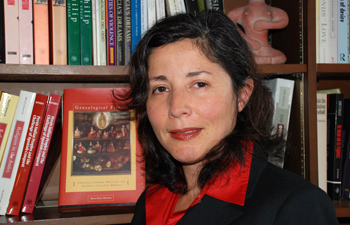
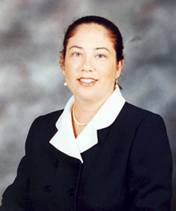
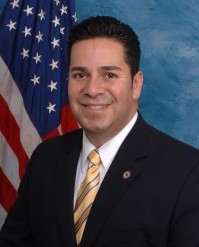
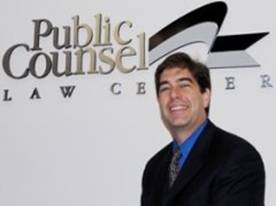
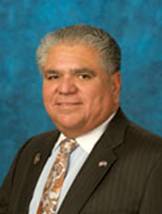
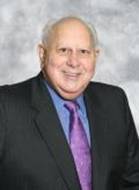
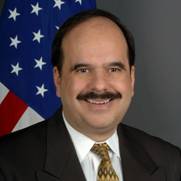
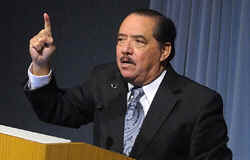 Dr.
Eloy Rodriguez knows a thing or two about making ones way in the
world. As a guest lecturer at NIHs observance of Hispanic
Heritage Month, he told how his love of science and tremendous
family support took him from an impoverished upbringing to the
groundbreaking science he is conducting today.
Dr.
Eloy Rodriguez knows a thing or two about making ones way in the
world. As a guest lecturer at NIHs observance of Hispanic
Heritage Month, he told how his love of science and tremendous
family support took him from an impoverished upbringing to the
groundbreaking science he is conducting today.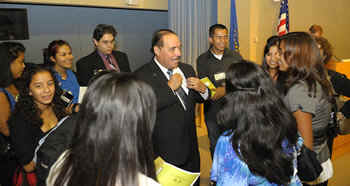 Rodriguez is professor of ethno botanical medicine (the study of how
people interact with plants) and pharmacognosy (the study of
medicines derived from natural sources) at Cornell University. He
speaks with a booming voice and is fueled by a passion for the
medicine that can be found in the Earths most powerful and
beneficial flowers, herbs and food. He told the audience, which
included dozens of students visiting from Wheaton High School, that
he is inspired by the knowledge that some cultures, both current and
long gone, have been working with these same plants for hundreds,
perhaps thousands of years.
Rodriguez is professor of ethno botanical medicine (the study of how
people interact with plants) and pharmacognosy (the study of
medicines derived from natural sources) at Cornell University. He
speaks with a booming voice and is fueled by a passion for the
medicine that can be found in the Earths most powerful and
beneficial flowers, herbs and food. He told the audience, which
included dozens of students visiting from Wheaton High School, that
he is inspired by the knowledge that some cultures, both current and
long gone, have been working with these same plants for hundreds,
perhaps thousands of years.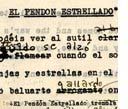
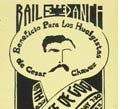
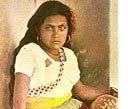


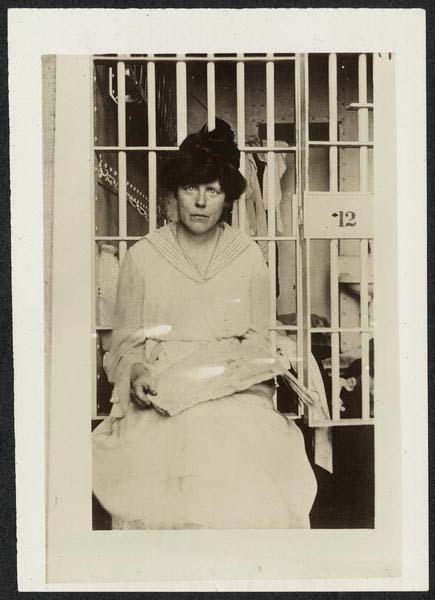
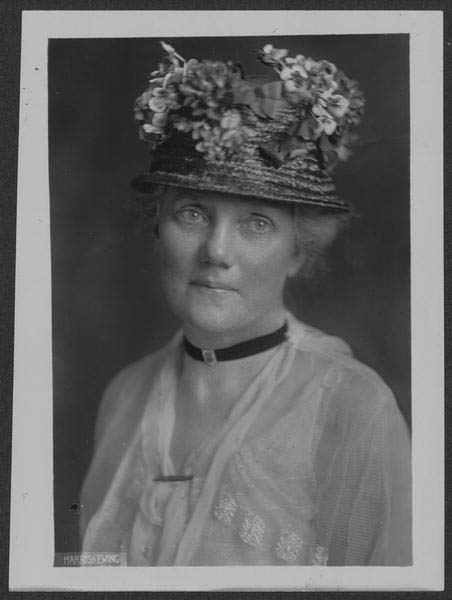
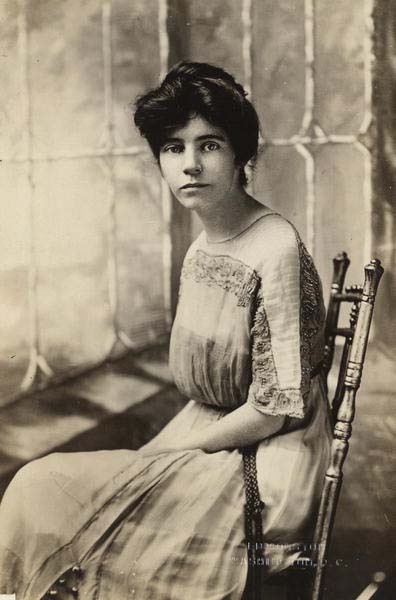
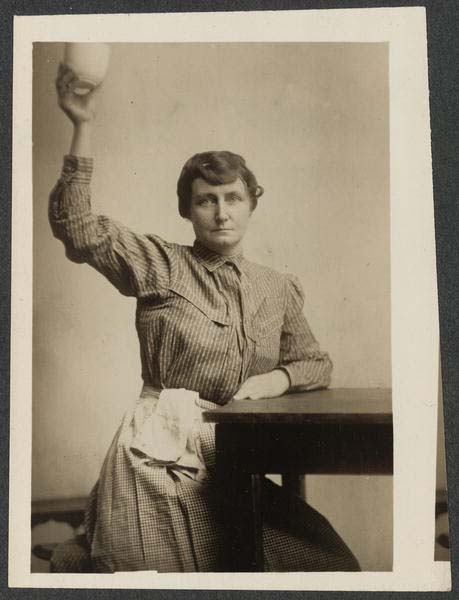
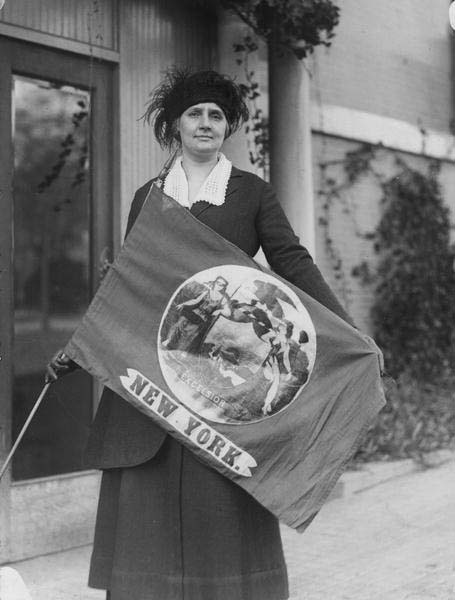
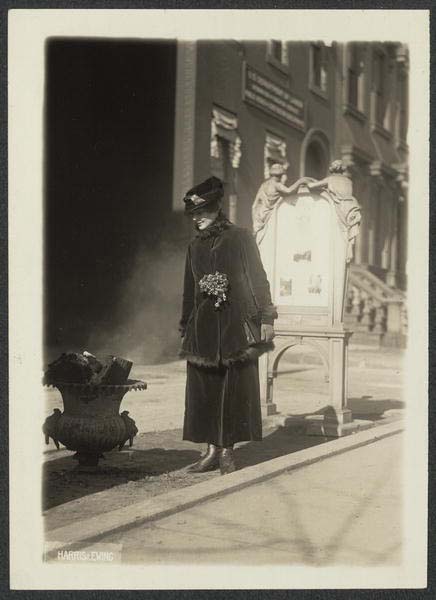
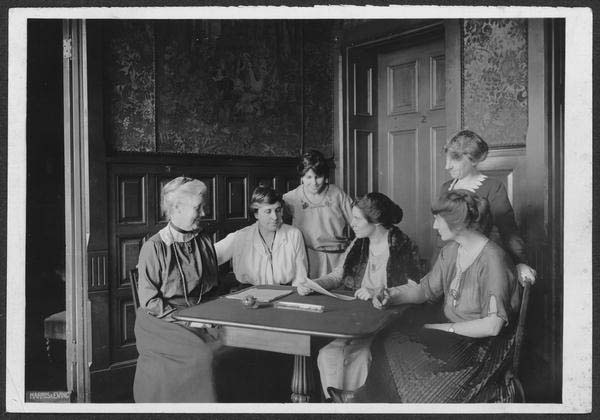

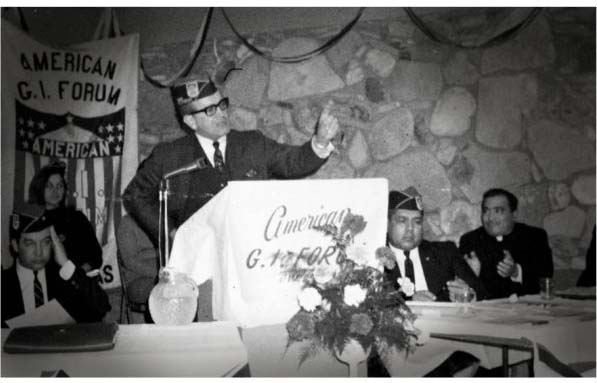

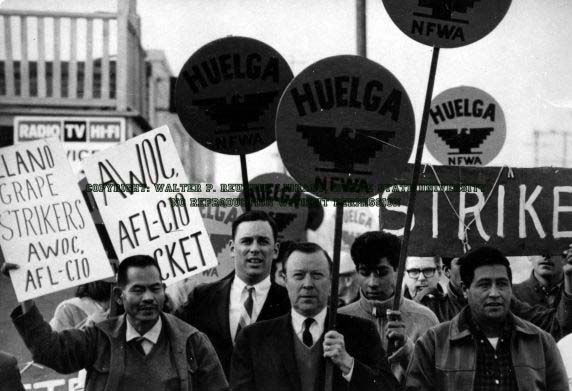
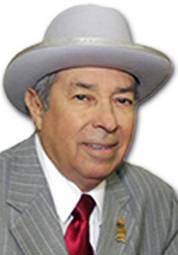

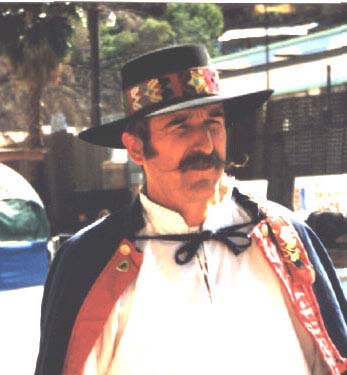

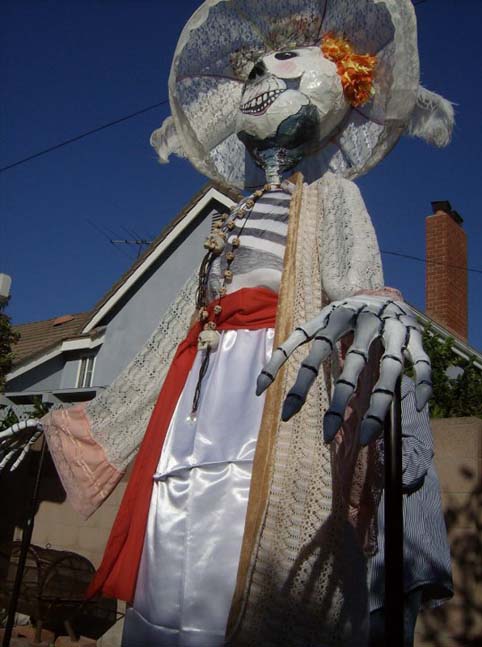 The Austin Chapter of the National Hispanic Profession
Organization
decided to honor their ancestors by cleaning a cemetery, the Maria de la Luz Cemetery.
The Austin Chapter of the National Hispanic Profession
Organization
decided to honor their ancestors by cleaning a cemetery, the Maria de la Luz Cemetery. 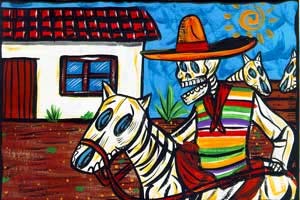
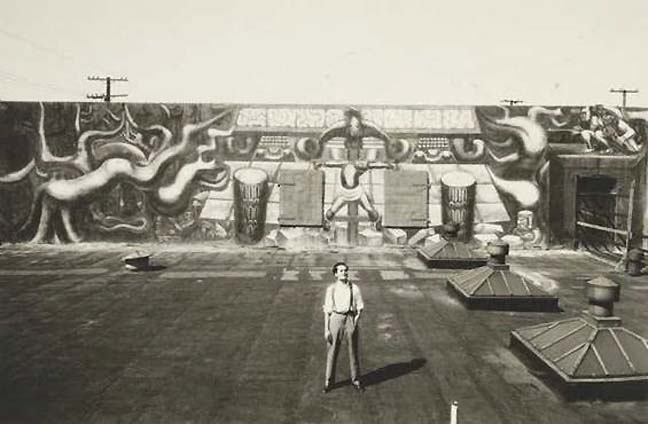
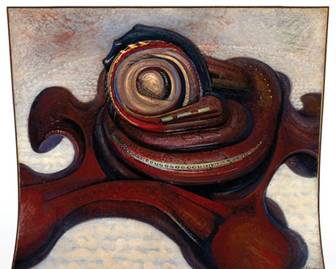

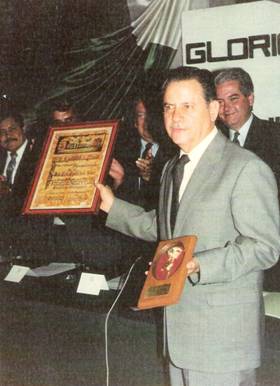
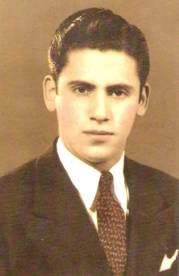
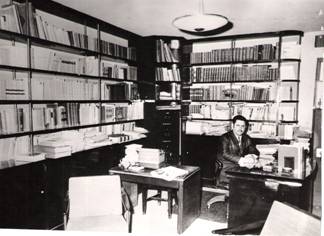
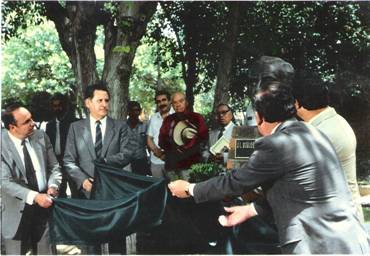
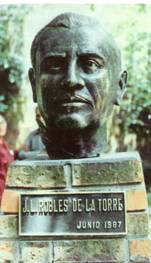
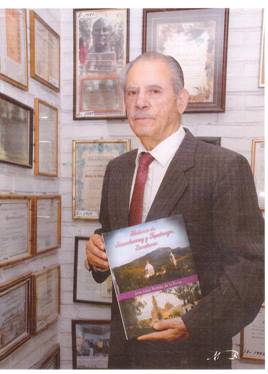
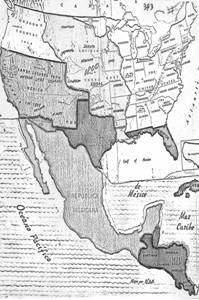
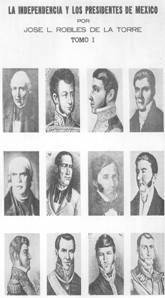
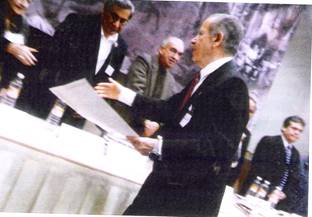
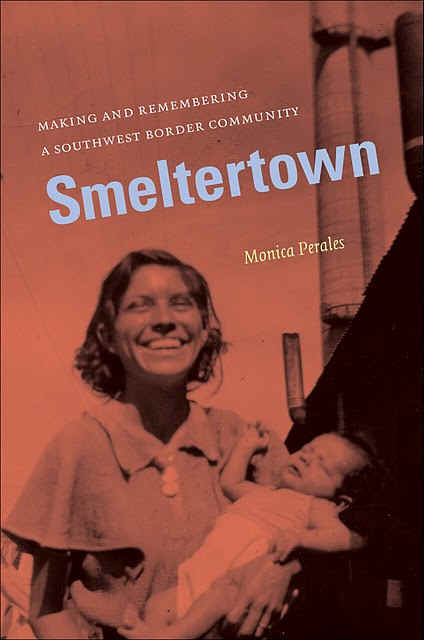
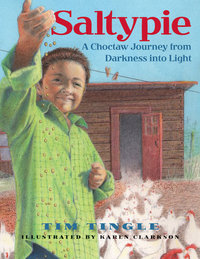
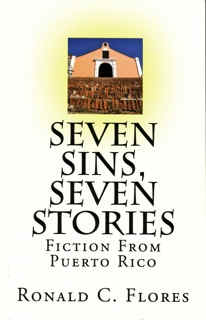
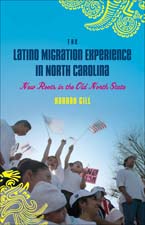
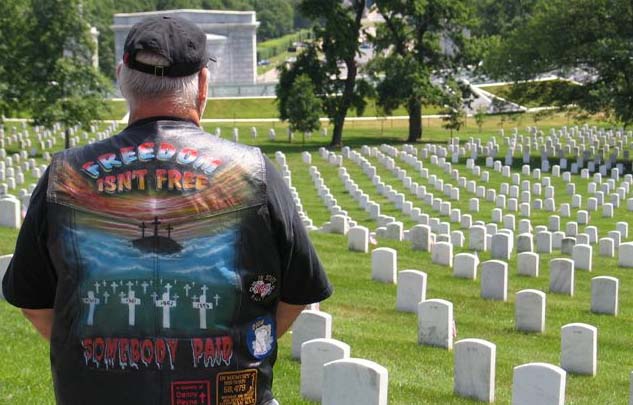
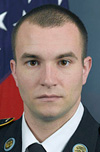
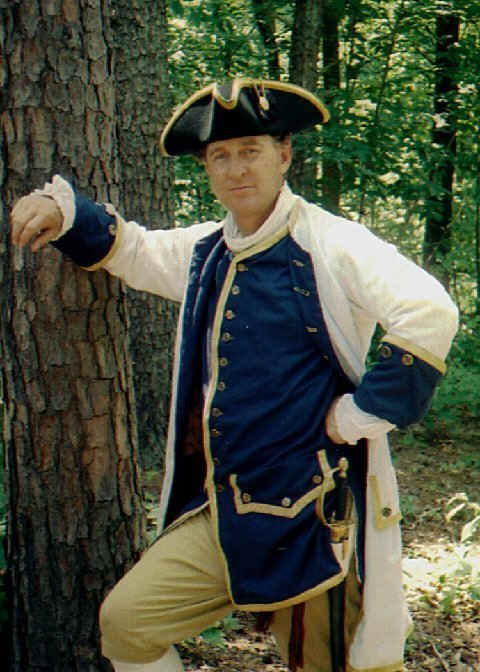







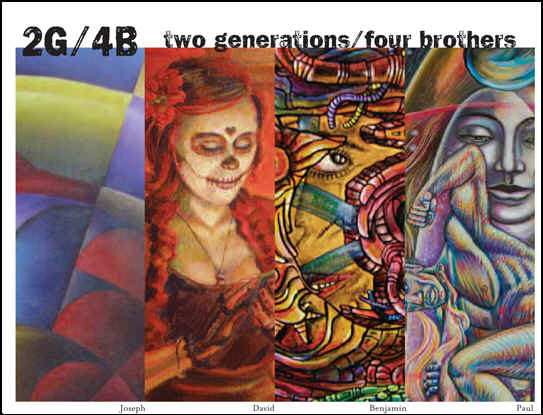
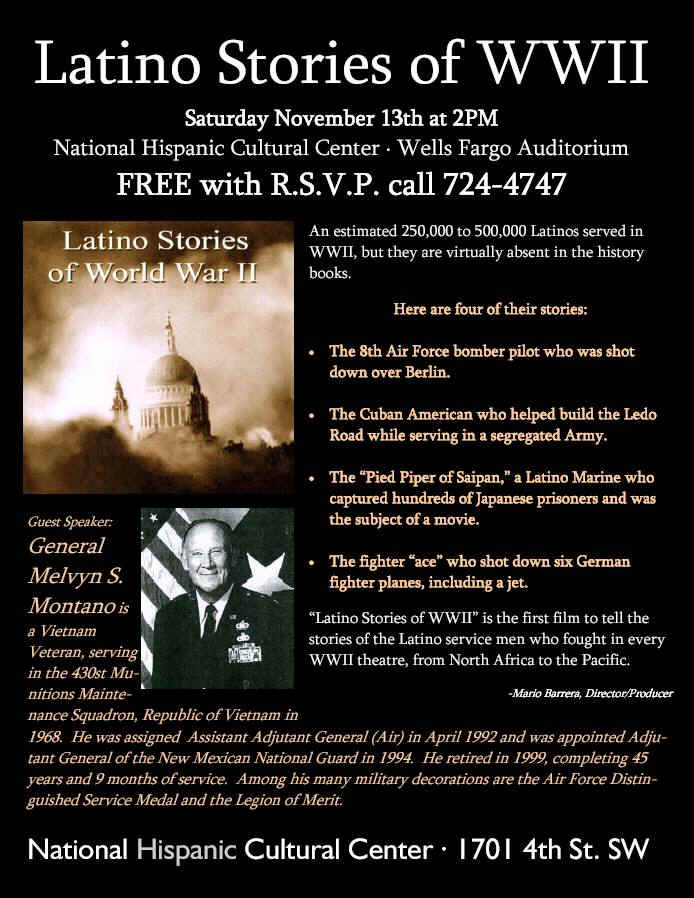
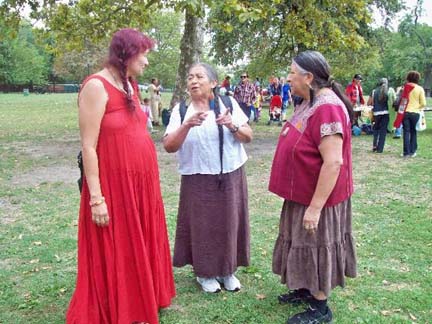
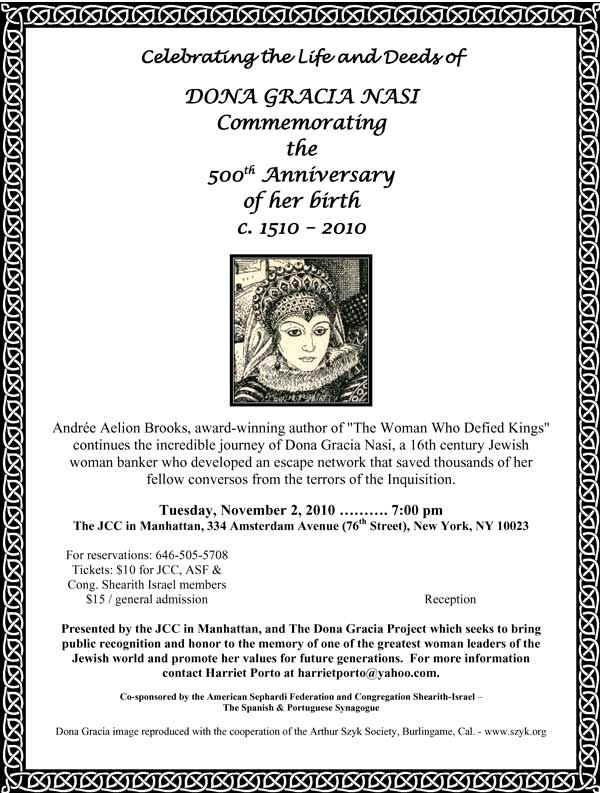
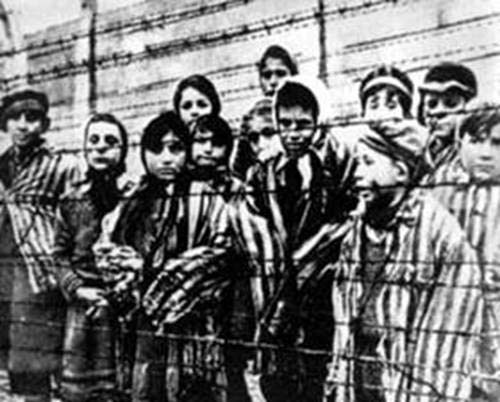
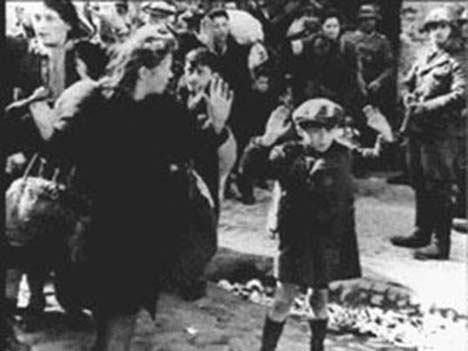
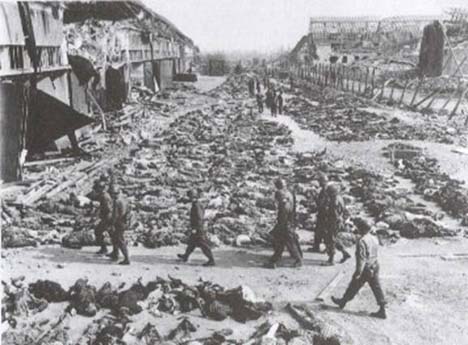
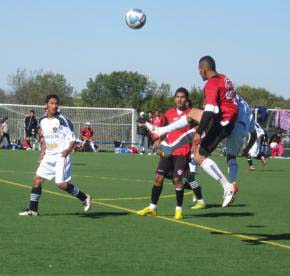
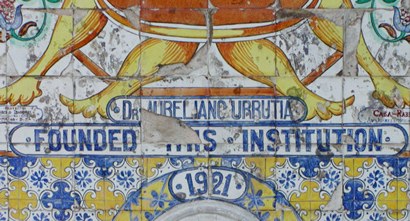
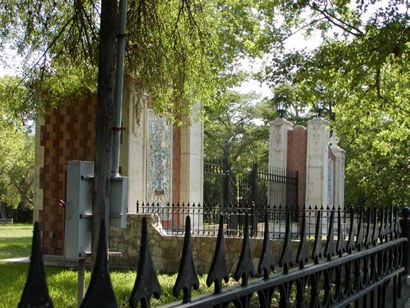
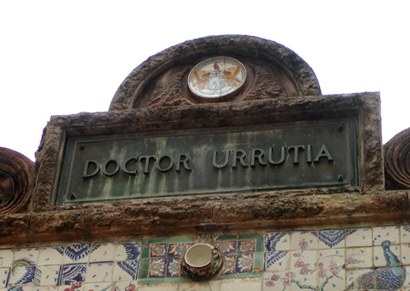
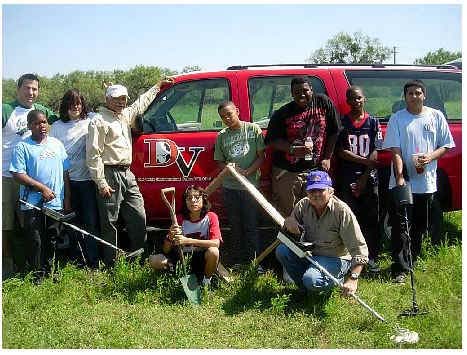
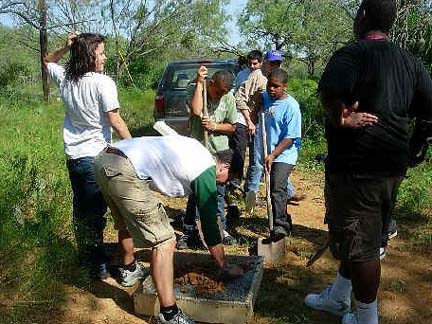
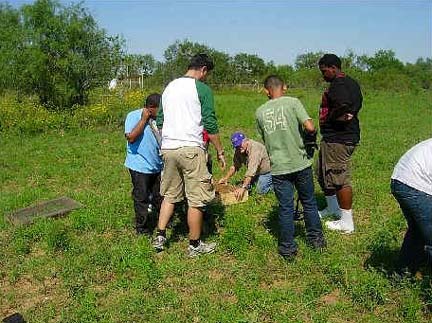
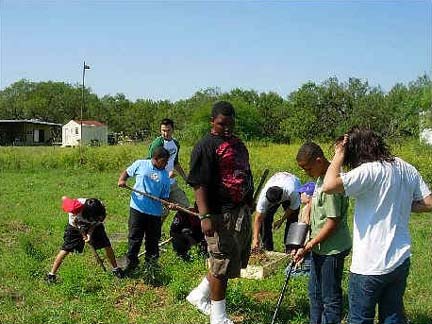
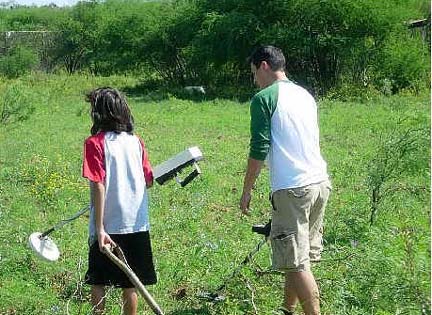
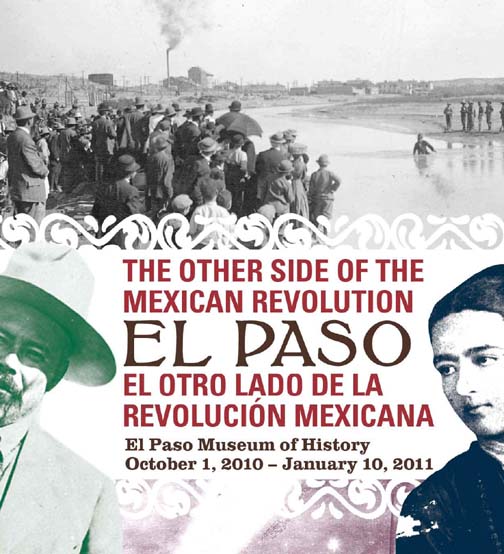
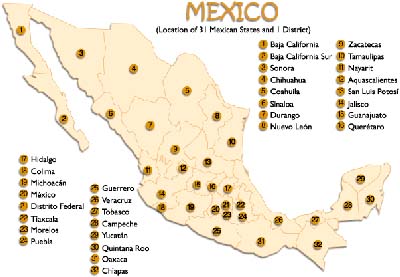
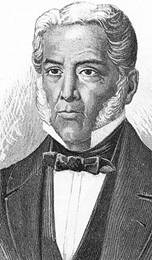
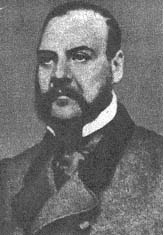
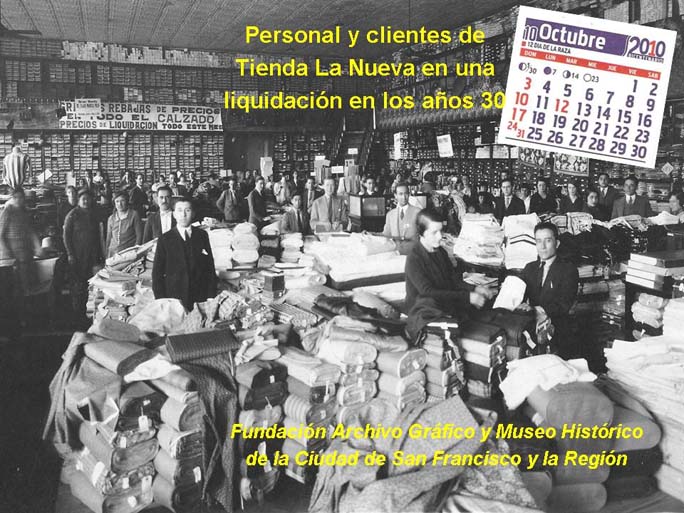
 We
work in communities of extreme poverty in Oakland and in rural
communities in El Salvador, writes Tulio Serrano, Director of
the Central American Refugee Committee (CRECE). Our
organization brings hope to those in need by providing immediate
needs such as food, clothing and friendship. We have created and
expanded opportunities for children and youth. We have also
expanded our work with youth by developing alternative positive
venues to the streets and gangs.
We
work in communities of extreme poverty in Oakland and in rural
communities in El Salvador, writes Tulio Serrano, Director of
the Central American Refugee Committee (CRECE). Our
organization brings hope to those in need by providing immediate
needs such as food, clothing and friendship. We have created and
expanded opportunities for children and youth. We have also
expanded our work with youth by developing alternative positive
venues to the streets and gangs.